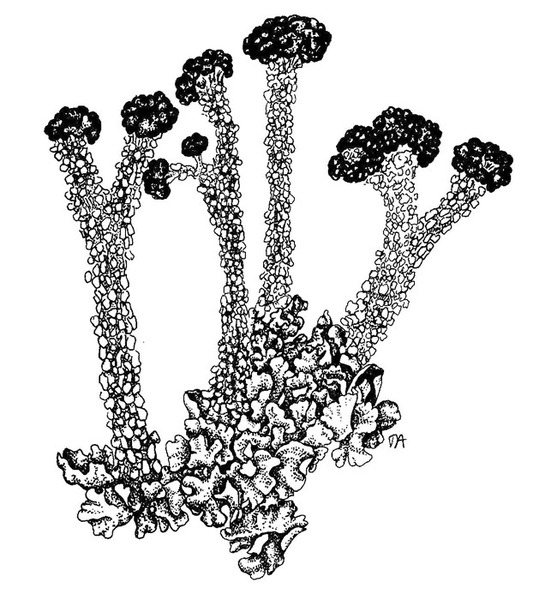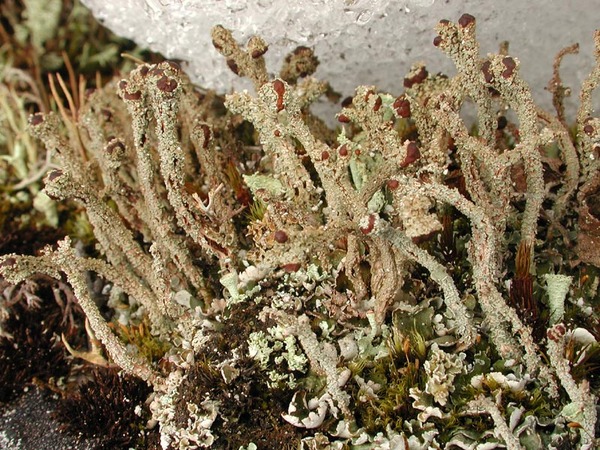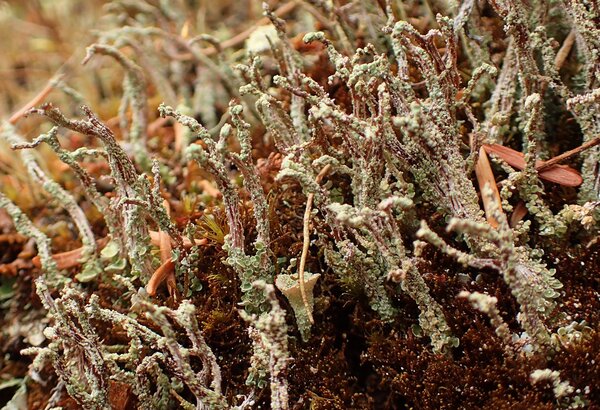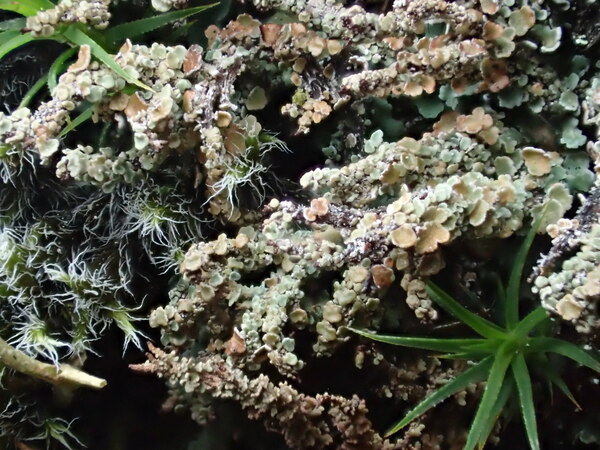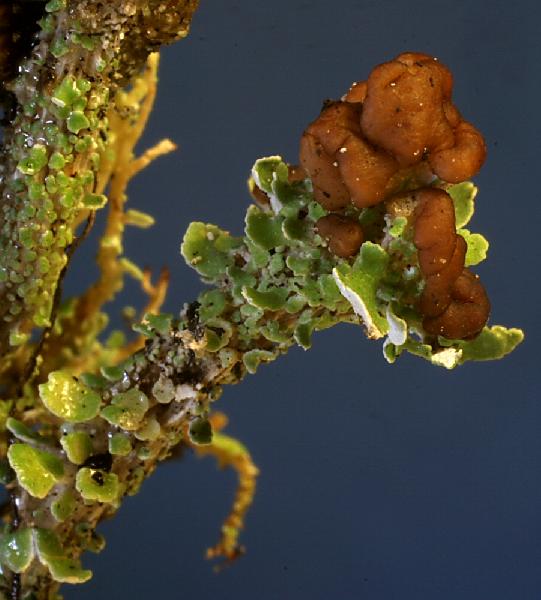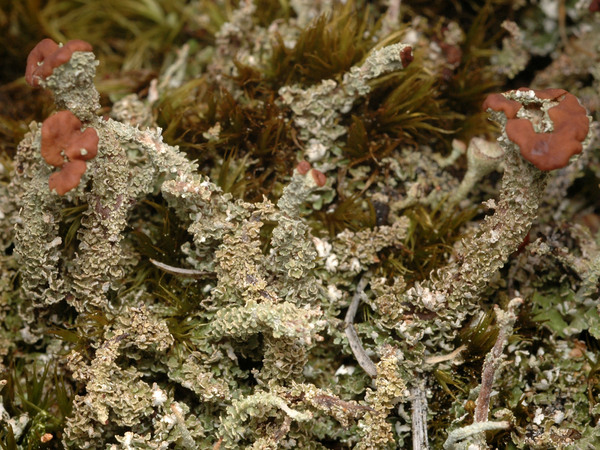Cladonia macrophylla (Schaer.) Stenh.
Lich. Suec. Exs., ed. 2, Fasc. 7: 3, 1865. Basionym: Cladonia ventricosa var. macrophylla Schaer. - Lich. Helv. Spicil., 1(6): 316, 1833.
Synonyms: Cladonia alpicola (Flot.) Vain.
Description: Primary thallus squamulose, usually persistent and forming large colonies, the squamules 3-6(-10) mm long, 2-6 mm wide, round or weakly elongate, lobate to incised, glaucescent to rarely olive-green and often verruculose or checkered above, white beneath, sometimes darkening towards the attachment point. Podetia rather rare, cupless, hollow inside, elongate, 1-3(-5) cm tall, 0.8-1(-5) mm thick, simple or sparingly branched, with blunt apices, glaucous grey to brownish grey, paler or yellowish towards the base, fissured, with numerous, up to 1 mm (usually less) wide, peltate squamules. Apothecia brown, convex, terminal on podetia, to 5 mm across. Asci 8-spored, clavate, thickened at apex, with a K/I+ blue tholus and a K/I+ strongly blue outer gelatinous sheath, Cladonia-type. Ascospores 1-celled, hyaline, ellipsoid. Pycnidia dark, semi-immersed on the tips of podetia and on the squamules, constricted at base, with a colourless jelly. Conidia hyaline, curved. Photobiont chlorococcoid. Spot tests: K-, C-, KC-, P+ yellow, UV-. Chemistry: psoromic, rangiformic and norrangiformic acids, plus minor unknown compounds.
Growth form: Fruticose
Substrata: soil, terricolous mosses, and plant debris
Photobiont: green algae other than Trentepohlia
Reproductive strategy: mainly sexual
Commonnes-rarity: (info)
Alpine belt: rare
Subalpine belt: rather rare
Montane belt: absent
Dry submediterranean belt: absent
Humid submediterranean belt: absent
Padanian area: absent
pH of the substrata:
1 2 3 4 5
Solar irradiation:
1 2 3 4 5
Aridity:
1 2 3 4 5
Eutrophication:
1 2 3 4 5
Poleotolerance:
0 1 2 3
Altitudinal distribution:
1 2 3 4 5 6
Rarity
absent
extremely rare
very rare
rare
rather rare
rather common
common
very common
extremely common
Loading data...
Occurrence data
Predictive map
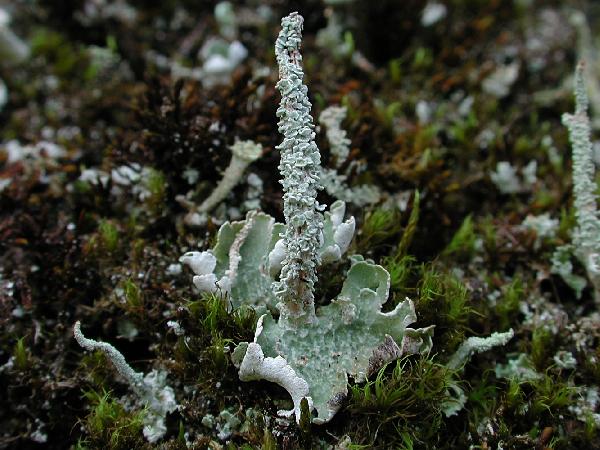
Ulrich Kirschbaum CC BY-SA 4.0 - Source: https://www.thm.de/lse/ulrich-kirschbaum/flechtenbilder
Sweden: Värmland.
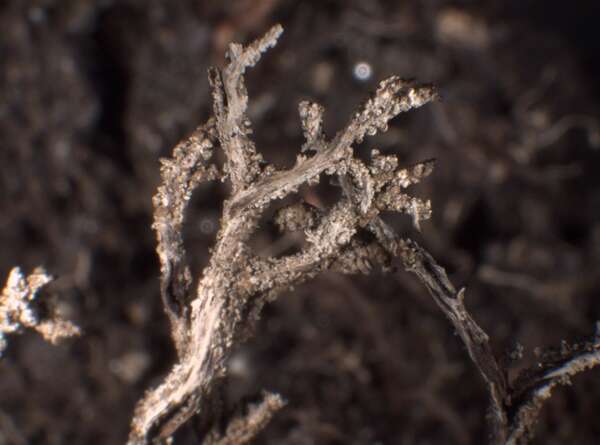
P.L. Nimis; Owner: Department of Life Sciences, University of Trieste
Herbarium: TSB (9155)
2002/12/18
tip of podetium
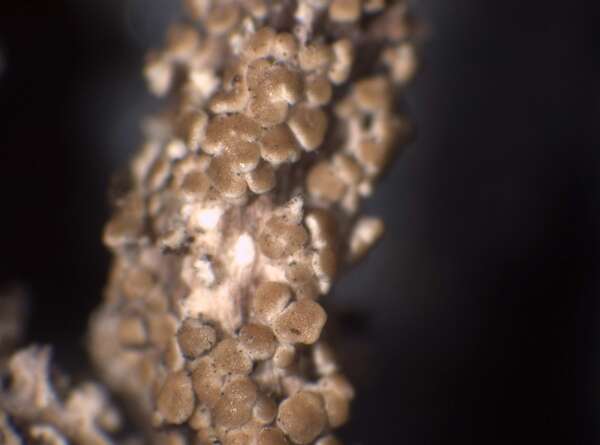
P.L. Nimis; Owner: Department of Life Sciences, University of Trieste
Herbarium: TSB (9155)
2002/12/18
detail of cortex
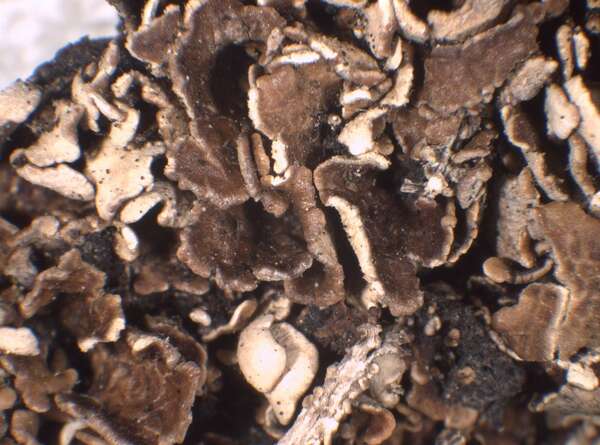
P.L. Nimis; Owner: Department of Life Sciences, University of Trieste
Herbarium: TSB (9155)
2002/12/18
primary squamules
Growth form: Fruticose
Substrata: soil, terricolous mosses, and plant debris
Photobiont: green algae other than Trentepohlia
Reproductive strategy: mainly sexual
Commonnes-rarity: (info)
Alpine belt: rare
Subalpine belt: rather rare
Montane belt: absent
Dry submediterranean belt: absent
Humid submediterranean belt: absent
Padanian area: absent
pH of the substrata:
| 1 | 2 | 3 | 4 | 5 |
Solar irradiation:
| 1 | 2 | 3 | 4 | 5 |
Aridity:
| 1 | 2 | 3 | 4 | 5 |
Eutrophication:
| 1 | 2 | 3 | 4 | 5 |
Poleotolerance:
| 0 | 1 | 2 | 3 |
Altitudinal distribution:
| 1 | 2 | 3 | 4 | 5 | 6 |
Rarity
absent
extremely rare
very rare
rare
rather rare
rather common
common
very common
extremely common
Loading data...
Occurrence data
Predictive map

Ulrich Kirschbaum CC BY-SA 4.0 - Source: https://www.thm.de/lse/ulrich-kirschbaum/flechtenbilder
Sweden: Värmland.

P.L. Nimis; Owner: Department of Life Sciences, University of Trieste
Herbarium: TSB (9155)
2002/12/18
tip of podetium

P.L. Nimis; Owner: Department of Life Sciences, University of Trieste
Herbarium: TSB (9155)
2002/12/18
detail of cortex



